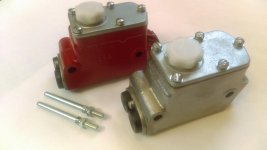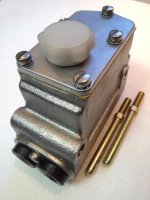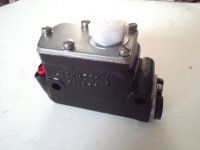I'm confused. I've been around Spridgets for many years and I'm planning to build two Bugeyes with disc brakes. One will use a later pedal box with separate brake and clutch cylinders for a single circuit brake system as found on '67 cars. The other will use a combined brake/clutch cylinders. Years ago I bought a combined master cylinder for a '62 Mk II Sprite with drum brakes. I never finished that car, so I planned to get that cylinder sleeved to 3/4" for my new project. I have also bought two pairs of later Morris Minor 3/4" bore rear brake cylinders. Today I read on the BugeyeGuy website that he actually prefers the 7/8" bore master cylinders for disc brake cars. Any opinions would be appreciated. Thanks.
-
 Hi Guest!
Hi Guest!
You can help ensure that British Car Forum (BCF) continues to provide a great place to engage in the British car hobby! If you find BCF a beneficial community, please consider supporting our efforts with a subscription.
There are some perks with a member upgrade!**Upgrade Now**
(PS: Subscribers don't see this gawd-aweful banner
3/4" Bore or 7/8" Bore Master Cylinder For Disc Brakes?
- Thread starter Randyz
- Start date


 smilie in place of the real @
smilie in place of the real @
 Pretty Please - add it to our Events forum(s) and add to the calendar! >>
Pretty Please - add it to our Events forum(s) and add to the calendar! >> 



